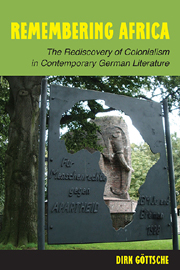Book contents
- Frontmatter
- Contents
- Acknowledgments
- Introduction
- 1 From Colonial Fantasies to Postcolonial Memory: Historical and Theoretical Parameters
- 2 Remembering German Colonialism
- 3 Rewriting Colonialism in Cross-Cultural and Transcultural Perspective
- 4 Remapping the History of European Colonialism
- 5 From the Past to the Present and Back: Colonial History and Family History
- 6 Conclusion: German (Post)colonial Memory in Perspective
- Bibliography
- Index of Authors and Works Discussed
- General Index
1 - From Colonial Fantasies to Postcolonial Memory: Historical and Theoretical Parameters
Published online by Cambridge University Press: 05 July 2013
- Frontmatter
- Contents
- Acknowledgments
- Introduction
- 1 From Colonial Fantasies to Postcolonial Memory: Historical and Theoretical Parameters
- 2 Remembering German Colonialism
- 3 Rewriting Colonialism in Cross-Cultural and Transcultural Perspective
- 4 Remapping the History of European Colonialism
- 5 From the Past to the Present and Back: Colonial History and Family History
- 6 Conclusion: German (Post)colonial Memory in Perspective
- Bibliography
- Index of Authors and Works Discussed
- General Index
Summary
Postcolonial Studies, Cross-Cultural Literary Studies, and Memory Studies
The fact that Edward Said's Orientalism, which marks the beginnings of postcolonial studies as an interdisciplinary and international field of cultural theory and research, was published in the same year (1978) as Uwe Timm's novel Morenga about Germany's colonial war in South-West Africa, now considered a modern classic in the critical literary memory of German colonial history, would initially seem to suggest that postcolonial thought in (West) Germany developed broadly in tandem with international Anglophone discourse. After all, Timm's literary critique of colonial imperialism builds on the engagement of West German writers and intellectuals of the 1960s with the anticolonial theory of Aimé Césaire, Albert Memmi, Frantz Fanon, and other (mostly Francophone) critics involved in the politics of liberation and decolonization from the 1940s to 1960s, and these same critics also act as crucial points of reference for the (mostly Anglophone) postcolonial theory developed by Said, Homi Bhabha, Gayatri Chakravorty Spivak, Stuart Hall, Robert Young, Ania Loomba, and others from the late 1970s to the 1990s. International postcolonial theory and postcolonial critique in German literature are at one level modified extensions of the anticolonial discourse developed by intellectuals and writers both in the “South” and in the “North” during the mid-twentieth century.
- Type
- Chapter
- Information
- Remembering AfricaThe Rediscovery of Colonialism in Contemporary German Literature, pp. 21 - 62Publisher: Boydell & BrewerPrint publication year: 2013



